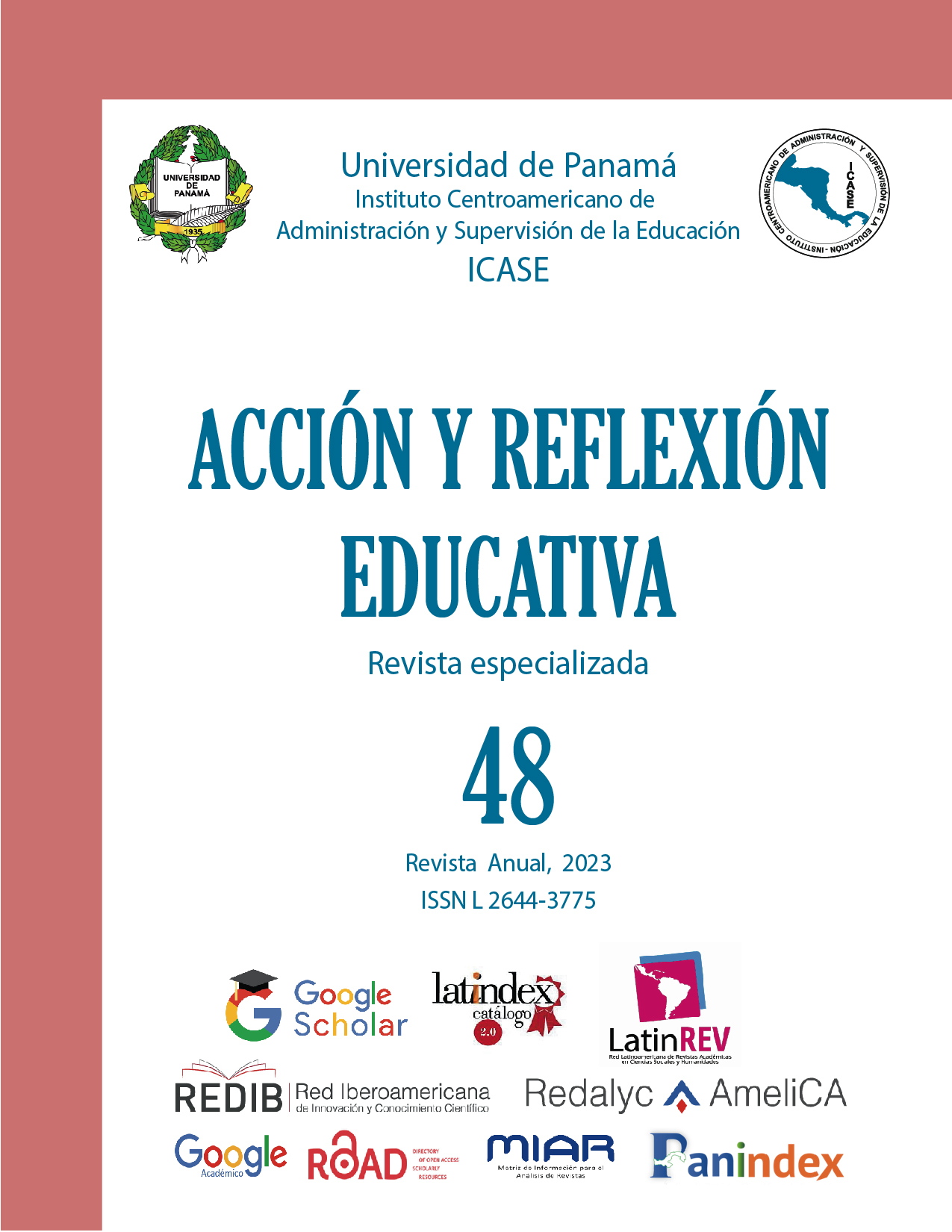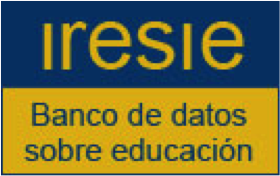Prácticas y saberes pedagógicos de las madres comunitarias rurales del municipio de Paya (Colombia)
DOI:
https://doi.org/10.48204/j.are.n48.a3462Palabras clave:
práctica pedagógica, educación inicial, vulnerabilidad social, primera infanciaResumen
El presente artículo tiene por objetivo, comprender las prácticas y saberes pedagógicos de las Madres Comunitarias (MC) a partir de sus saberes y prácticas, en un contexto rural de vulnerabilidad social. Se abordan categorías de conocimiento y experiencias cotidianas que se configuran en el marco de la educación inicial en Colombia, a partir de la labor de las MC en relación con pedagogía en educación inicial.
Se utilizó una metodología cualitativa con un diseño de investigación acción, utilizando la entrevista y el grupo focal. Las participantes del estudio fueron 7 madres comunitarias rurales del municipio Paya Boyacá- Colombia.
Los resultados presentan las categorías de análisis que intervienen para la pedagogía del enfoque de educación inicial y que van en coherencia en la praxis de las MC. Encontrando barreras en cuanto al sentido y la apropiación del concepto en educación inicial a favor del desarrollo integral de los niños y niñas en contextos rurales. Las prácticas pedagógicas de las MC, se gestan desde su saber empírico, pero con intenciones de reflexión para la transformación.
Se concluye que los procesos de cualificación a MC se deben orientar con un sentido holístico, en relación con la práctica pedagógica, las teorías y conceptualización en educación inicial.
Descargas
Citas
Angrosino, M. (2016). La educación inicial en Colombia, una perspectiva de equidad y calidad. Editorial. Morata. https://www.mineducacion.gov.co/1621/article-192210.html.
Bernal, R. (2014). Diagnóstico y recomendaciones para la atención de calidad a la primera infancia. Cuadernos Fedesarrollo 51. https://www.repository.fedesarrollo.org.co/bitstream/handle/11445/148/CDF_No_51_Abril_2014.pdf?sequence=3&isAllowed=y.
Bernal, R. y Camacho, A. (2014). La Política de Primera Infancia en el contexto de la equidad y movilidad social en Colombia. Universidad de los Andes. Documento CEDE. http://www.deceroasiempre.gov.co/Prensa/CDocumentacionDocs/Politica-PrimeraInfancia-Contexto-Equidad-Movilidad-Social-Colombia.Ppdf.
Blanco, R. y Arias. C. (2016). Riesgos Individuales y académicos de las madres comunitarias en cualificación. Revista horizontes pedagógicos, 18 (2), 39-51. https://dialnet.unirioja.es/servlet/articulo?codigo=5896177.
Camargo, M. (2013). La intervención educativa en la educación inicial en zonas de riesgo y alto riesgo social en Bogotá, Colombia. Universidad Complutense de Madrid.
Camacho, F. (2014). Infancia y representaciones sociales. Política y sociedad Madrid. 43(1), pp. 27-42.
Castañeda Pezo, P. (2003). Manual de apoyo para material didáctico. Gobierno de Chile. Ministerio de Educación.
Cárdenas Restrepo, A. B. (2018). El sentido de la educación inicial. Panamericana Formas e Impresiones S.A.
Comisión Económica para América Latina. (2020). La ciudad y los derechos de niñas, niños y adolescentes. Boletín Desafíos. 23 https://www.cepal.org/es/publicaciones/45102-la-ciudad-derechos-ninas-ninos-adolescentes.
Cerda Gutiérrez, H. (2003). Educación preescolar: historia, legislación, currículo y realidad socioeconómica. Cooperativa Editorial Magisterio.
Comisión Intersectorial para la Primera Infancia. (2014). Estrategia de Atención a la Primera Infancia De Cero a Siempre. Documento para la construcción de la ruta con enfoque diferencial. Difusión. http://www.deceroasiempre.gov.co/QuienesSomos/Paginas/ComisionIntersectorial.aspx.
Consejo Nacional de Política Económica y Social 109. (2007). Política Pública Nacional de Primera Infancia. Ministerio de la Protección Social. Ministerio de Educación Nacional Instituto Colombiano de Bienestar Familiar DNP-DDS-SS.
Decreto 088 de 1976. Se reestructura el sistema educativo y se reorganiza el Ministerio de Educación Nacional. https://www.mineducacion.gov.co/1759/articles-102584_archivo_pdf.pdf.
De Zubiría, J. (2011). Los modelos pedagógicos: hacia una pedagogía dialogante. Cooperativa Editorial Magisterio.
Jaramillo, L. (2009). La Política de Primera Infancia y las Madres Comunitarias. Zona Próxima, (11), 86-101. https://www.redalyc.org/articulo.oa?id=85313003006.
Gallardo Gil, M. (2015). La escuela de contexto rural: ¿de la diferencia a la desigualdad? Revista Iberoamericana de Educación, 55 (5), 1-10. doi.org/10.35362/rie5551566.
Heckman, J. (2011). El poder de los primeros años: políticas para fomentar el desarrollo humano. Revista Infancias Imágenes, 10 (1). 97 – 109. https://revistas.udistrital.edu.co/index.php/infancias/article/view/4468/6209.
Latorre, A. (2005). La investigación acción. Conocer y cambiar la práctica educativa. Editorial Grao.
MacMillan J. H. y Schumacher, S. (2005). Investigación Educativa 5 Ed. www.FreLibros.me
Ministerio de Protección Social. Ley 1098. (2006). Código de infancia y adolescencia en Colombia. https://www.icbf.gov.co/cargues/avance/docs/ley_1098_2006.htm.
Ministerio de Educación Nacional. Ley 1804 (2016). Por la cual se establece la política de Estado para el Desarrollo Integral de la Primera Infancia de Cero a Siempre y se dictan otras disposiciones. Congreso de la Republica. Bogotá, Colombia.
Ministerio de Educación Nacional. Ley 115 (1994). Ley General de Educación en Colombia. https://www.funcionpublica.gov.co/eva/gestornormativo/norma.php?i=292.
Ministerio de Educación Nacional. (2009). Atención Integral a la Primera Infancia. Imprenta Nacional. https://www.mineducacion.gov.co/1979/w5-propertyvalue-62489.html.
Ministerio de Educación Nacional. (2016). Normatividad Colombiana.
https://www.mineducacion.gov.co/1759/w3-propertyvalue-51456.html.
Ministerio de Educación Nacional. (2018). Normatividad Colombiana.
https://www.mineducacion.gov.co/1759/w3-propertyvalue-51456.html.
Ortega Valencia, P. (2008). Prácticas pedagógicas. Documento borrador. Universidad Pedagógica Nacional. studylib.es/ doc/621954/practicas-pedagógicas—mi práctica 2010.
Paniagua, G. (2021). El aporte de buenas interacciones en educación infantil. En V., Peralta y L. Hernández (Eds). Antología de experiencias de la educación inicial Iberoamericana. (pp. 22-38). Organización de Estados Iberoamericanos para la Educación, la Ciencia y la Cultura (OEI). https://www.oei.es/uploads/files/microsites/28/140/infancia2.pdf.
Peralta, M. (2007). Una pedagogía de las oportunidades. Nuevas ventanas para los párvulos latinoamericanos del siglo XXI. Editorial Andrés Bello.pdf.
Puello G, A. y Romero L., L. (2019). Características de las madres comunitarias en Turbaco-Bolívar (Colombia). Revista CS, (15), 111 - 139. http://www.scielo.org.co/pdf/recs/n15/n15a06.pdf.
Plan de Desarrollo Municipal. (2019). Alcaldía de Paya, Boyacá, Colombia.
Prieto, R. y March, J. (2010). Paso a paso en el diseño de un estudio de madres Comunitarias en Colombia mediante grupos focales. Atención primaria, 29(6), 366–373. doi.org/10.1016/s0212-6567(02)70585-4.
Rentería Rodríguez, C. (2007). Departamento Nacional de Planeación. Gráficas Ducal, Ltda. https://observatorioplanificacion.cepal.org/es/instituciones/departamento-nacional-de-planeacion-dnp-de-colombia.
Rincón, M. (2014). Estrategias Pedagógicas para la atención e intervención de la primera Infancia. Fundamentos Políticos Técnicos y de Gestión. Imprenta Nacional. https://www.mineducacion.gov.co/1759/articles-177829_archivo_pdf_fundamentos_ceroasiempre.pdf.
Sistema de Información de Primera Infancia- SIPI. (2018) Procesos de Formación a agentes Educativos en Colombia. www.mineducacion.gov.co/portal/Educacion-inicial/Sistema-de-Educacion-Inicial/406023:Sistema-de-Informacion-de-Primera-Infancia.
Soler Rocha, J. E., y Ramírez Valbuena, W. (2021). Educación rural Boyacense en época de pandemia: Societas, 23(2), 124-144. https://revistas.up.ac.pa/index.php/societas/article/view/2306.
Soto, F. y Casanova, H. (2009). Madres comunitarias, el ser y el hacer, una construcción social. Universidad Tecnológica de Pereira. https://hdl.handle.net/11059/1590.
UNESCO. (2006). Educación para todos, el imperativo de la calidad. Informe de Seguimiento de la EPT en el mundo. En: http://www.unesco.org/education/gmrdownload/es_summary.pdf.
UNICEF. (2016). Estado Mundial de la Infancia. Una oportunidad justa para cada niño. https://www.unicef.org/es/informes/estado-mundial-de-la-infancia-2016.
Vásquez, D. y Pineda H. (2016). Madre Comunitaria: Transformación de su quehacer a través del tiempo. Magister en desarrollo educativo y social. Universidad Pedagógica Nacional. Colombia phttps://repository.cinde.org.co/bitstream/handle/20.500.11907/1494/.
Zabala, J. (2016). Las madres Comunitarias en Colombia. Investigación sobre la Evaluación. Participativa. (Tesis Doctoral). Universidad de Granada. https//hera.urg.es/tesisugr/16131046.pdf.
Descargas
Publicado
Cómo citar
Número
Sección
Licencia

Esta obra está bajo una licencia internacional Creative Commons Atribución-NoComercial-CompartirIgual 4.0.











